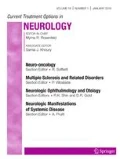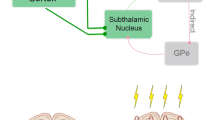Opinion statement
One of the more recently recognized problems in treatment of patients with Parkinson’s disease (PD) is development of cognitive dysfunction and, in many cases, frank dementia. As patients with PD live longer, because of improved care and treatment of motor symptoms, dementia in PD is becoming a major contributor to morbidity in the illness. Prevalence studies suggest that up to 30% of patients with PD develop dementia. Dementia in PD patients is often a multifactorial condition. Neuropathologic changes caused by PD itself may cause memory loss. However, some patients with PD and memory decline also have pathologic changes that are more consistent with Alzheimer’s disease. Many PD patients have a mix of the two types of pathology. Other factors, such as underlying illnesses, medication side effects, and interaction of therapeutic agents, may contribute to cognitive changes in PD patients. Predictors of development of dementia in PD include advancing age and severity of neurologic symptoms, which may interact with one another to produce this effect. Recent work suggests that tobacco use also may increase risk of PD dementia, despite its possible protective effect against development of PD itself. Presence of psychiatric illness, especially depression, may interfere with cognition and exacerbate memory loss. Reduction in the dose of dopaminergic agents and of other medications may be helpful in partially improving cognitive function in some cases. The balance between improvement of motor function and preservation of cognitive abilities must be weighed, and it is important for clinicians to discuss this trade-off with patients and their families. At this time, there is no US Food and Drug Administration-approved pharmacologic treatment for dementia in PD. However, medication used to treat Alzheimer’s disease, such as acetylcholinesterase inhibitors, may slow progression of memory loss in some PD patients. Based on work from small double-blind studies, open-label trials, and case reports, cholinesterase inhibitors may be tried for treatment of dementia in PD, as long as the patient and caregivers understand that these agents are being used on an off-label basis. Surgical intervention, such as deep brain stimulation of the subthalamic nucleus or globus pallidus internus, although useful for treatment of motor symptoms in some PD patients, does not improve cognitive function in most cases and may actually worsen cognition in patients with pre-existing dementia. There is no specific exercise regimen or dietary guidelines for patients with PD who develop dementia. However, patients should be encouraged to lead a healthy lifestyle; this may improve overall well-being, which could impact positively on cognition function. Similarly, although assistive devices have not been developed for people with PD who have memory loss, any aid that increases mobility will probably improve mental and physical function. Clinicians should be mindful of the increased caregiver burden posed by PD patients who also have dementia. They should intervene appropriately to prevent caregiver distress and “burn out.” Herbal and nutritional supplements have not been shown in clinical trials to be beneficial for treatment of any type of dementia, and thus are not recommended for PD patients with cognitive decline.
Similar content being viewed by others
References and Recommended Reading
Cummings JL: Intellectual impairment in Parkinson’s disease: clinical, pathologic, and biochemical correlates. J Geriatr Psychiatry Neurol 1988, 1:24–36.
Aarsland D, Andersen K, Larsen JP, et al.: Risk of dementia in Parkinson’s disease: a community based prospective study. Neurology 2001, 56:730–736. This is a well-designed study of community-dwelling patients that sheds light on how cognition is affected in higher functioning individuals with PD.
Hindle JV: Dementia in PD. In Parkinson’s Disease in the Older Patient. Edited by Payfer JR, Hindle JV. London: Arnold Press; 2001:3–117.
Green J, McDonald WM, Vitek JL, et al.: Cognitive impairments in advanced PD without dementia. Neurology 2002, 59:1320–1324.
Levy G, Schupf N, Tang M-X, et al.: Combined effect of age and severity on the risk of dementia in Parkinson’s disease. Ann Neurol 2002, 51:722–729. This is a population-based cohort study of 180 PD patients that looks at incident dementia. This is the first study to longitudinally examine the effects of risk factors for dementia in PD. The combined effect of two commonly cited risk factors for dementia in PD, age and severity of extrapyramidal symptoms, was examined.
Levy G: Do risk factors for Alzheimer’s disease predict dementia in Parkinson’s disease? An exploratory study. Mov Disord 2002, 17:250–257.
Colosimo C, Hughes AJ, Kilford L, Lees AJ: Lewy body cortical involvement may not always predict dementia in Parkinson’s disease. J Neurol Neurosurg Psychiatry 2003, 74:852–856.
Murat E: What causes mental dysfunction in Parkinson’s Disease? Mov Disord 2003, 18(suppl):S63-S71.
Tiraboschi P, Hansen LA, Alford M, et al.: Cholinergic dysfunction in diseases with Lewy bodies. Neurology 2000, 54:407–411.
McKeith I, Del Ser T, Spano P, et al.: Efficacy of rivastigmine in dementia with Lewy bodies: a randomized, double-blind, placebo-controlled international study. Lancet 2000, 356:2031–2036.
Hutchinson M, Fazzini E: Cholinesterase inhibition in Parkinson’s disease. J Neurol Neurosurg Psychiatry 1996, 61:324–326.
Aarsland D, Laake K, Larsen JP, Janvin C: Donepezil for cognitive impairment in Parkinson’s disease: a randomized controlled study. J Neurol Neurosurg Psychiatry 2002, 72:708–712. This is a controlled study with crossover design involving 14 PD patients. Cognition was shown to improve with donepezil, and motor symptoms did not worsen.
Werber EA, Rabey JM: The beneficial effect of cholinesterase inhibitors on patients suffering from Parkinson’s disease and dementia. J Neural Transm 2001, 108:1319–1325.
Kurita A, Ochiai Y, Kono Y, et al.: The beneficial effect of donepezil on visual hallucinations in three patients with Parkinson’s disease. J Geriatr Psychiatry Neurol 2003, 16:184–188.
Fabbrini G, Barbanti P, Aurilia C, et al.: Donepezil in the treatment of hallucinations and delusions in Parkinson’s disease. Neurol Sci 2002, 23:41–43.
Reading PJ, Luce AK, McKeith IG: Rivastigmine in the treatment of parkinsonian psychosis and cognitive impairment: preliminary findings from an open trial. Mov Disord 2001, 16:1171–1174.
Bullock R, Cameron A: Rivastigmine for the treatment of dementia and visual hallucinations associated with Parkinson’s disease: a case series. Curr Med Res Opin 2002, 18:258–264.
Aarsland D, Hutchinson M, Larsen JP: Cognitive, psychiatric and motor response to galantamine in Parkinson’s disease with dementia. Int J Geriatr Psychiatry 2003, 18:937–941.
Merello M, Nouzeilles MI, Cammarota A, Leiguarda R: Effect of memantine (NMDA antagonist) on Parkinson’s disease: a double-blind crossover randomized study. Clin Neuropharmacol 1999, 22:273–276. This is a study with crossover design assessing memantine in 12 PD patients. Cognition was not addressed, but effects of memantine on motor function in PD were examined.
Sano M, Stern Y, Marder K, et al.: A controlled trial of piracetam in intellectually impaired patients with Parkinson disease. Mov Disord 1990, 5:230–234.
Furigeld E, Gaggen M, Nedwick P, et al.: Double-blind study with phosphatidylserine in parkinsonian patients with senile dementia of the Alzheimer’s type (SDAT). Prog Clin Biol Res 1989, 317:1235–1246.
Kieburtz K: The effect of deprenyl and tocopherol on cognitive performance in early untreated Parkinson’s disease. Parkinson Study Group. Neurology 1994, 44:1756–1759.
Shoulson I: Where do we stand on neuroprotection? Where do we go from here? Mov Disord 1998, 13(suppl):46–48.
Kieburtz K: Designing neuroprotection trials in Parkinson’s disease. Ann Neurol 2003, 53(suppl):S100-S107.
Author information
Authors and Affiliations
Rights and permissions
About this article
Cite this article
Anderson, K.E. Dementia in Parkinson’s disease. Curr Treat Options Neurol 6, 201–207 (2004). https://doi.org/10.1007/s11940-004-0012-9
Issue Date:
DOI: https://doi.org/10.1007/s11940-004-0012-9




